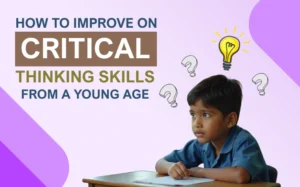Choosing the right path after completing the 12th standard is one of the most critical decisions in a student’s life. With countless options for a student after 12th, the pressure to make an informed choice can feel overwhelming. Whether you’re inclined toward science, commerce, arts, or vocational fields, understanding what to choose after 12th requires self-assessment, research, and guidance. A structured approach ensures that your career plan after 12th aligns with your interests, strengths, and long-term aspirations.
Making well-researched decisions leads to career satisfaction and growth. Exploring various fields, understanding job trends, and constantly upgrading skills ensure long-term career security, helping students build a successful professional journey.
Having a clear vision, exploring multiple career possibilities, and staying adaptable ensures a rewarding future. With the right guidance and planning, students can achieve success in their chosen fields while maintaining professional satisfaction.
Guidance on what to choose after 12th
Understanding Your Interests and Strengths
Before exploring the numerous options for a student after 12th, it is crucial to take time for self-reflection. Identifying academic strengths and personal interests plays a key role in shaping the right career plan after 12th. Are you fascinated by technology and problem-solving? Or do you feel passionate about creative fields like literature, animation, or graphic design? A proper evaluation of your strengths can help you determine what to choose after 12th.
To make this process easier, many career counselors suggest taking aptitude tests. These tests assess logical reasoning, creativity, and communication skills, offering valuable insights into suitable career paths. For example, students with a strong foundation in mathematics and physics may consider engineering, data science, or actuarial sciences. On the other hand, those interested in psychology or social sciences may explore careers in counseling, public administration, or human resource management. A well-thought-out career plan after 12th should blend both skills and aspirations.
A student’s hobbies and interests often indicate potential career paths. If you enjoy designing, you may consider graphic design or architecture. If you love problem-solving, engineering or finance could be ideal choices.
Exploring Traditional and Emerging Fields
The options for a student after 12th are no longer confined to conventional streams such as engineering, medicine, or law. In today’s rapidly evolving job market, numerous emerging fields provide exciting career opportunities. Whether it is artificial intelligence, environmental science, ethical hacking, or digital marketing, newer fields are shaping the future.
For example, students inclined toward cybersecurity can enhance their career plan after 12th by pursuing specialized certifications alongside a degree in computer science. Similarly, creative individuals can merge traditional arts with modern technology through courses in animation, UI/UX design, and filmmaking. A deep dive into industry trends and new-age professions can help determine what to choose after 12th for long-term career success.
Exploring unconventional careers like game design, food technology, or space research can open doors to exciting opportunities. The world is evolving, and many fields now offer lucrative prospects with significant job satisfaction.
Balancing Passion and Practicality
While passion is crucial in career success, practical considerations like financial stability, job demand, and growth prospects cannot be ignored. Striking a balance between personal interests and industry requirements is vital when creating a career plan after 12th. For instance, opting for a niche field such as astronomy may require advanced degrees with limited job openings, whereas careers in IT, healthcare, or business management offer broader prospects.
Financial constraints also play a role in decision-making. Professional courses like medicine, law, and aviation require significant investment, while government scholarships, online courses, and vocational programs offer cost-effective alternatives. Evaluating all factors ensures that the options for a student after 12th are realistic, fulfilling, and aligned with future opportunities.
Analyzing job availability and market trends before finalizing a career choice is necessary. A well-informed decision ensures both job satisfaction and financial security, making long-term career planning more effective and sustainable.
Seeking Mentorship and Guidance
An effective career plan after 12th is often shaped by mentorship and professional advice. Engaging with teachers, industry professionals, and alumni can provide clarity on course structure, job prospects, and skill requirements. Shadowing professionals or undertaking internships can further refine career interests.
Online platforms such as LinkedIn, Quora, and Reddit offer a wealth of knowledge, where experts share insights on their career journeys. Engaging in these discussions can help students assess the practicality of various options for a student after 12th. Personalized guidance ensures that students make informed choices regarding what to choose after 12th.
Connecting with seniors and professionals in your chosen field through networking sites like LinkedIn can offer practical insights. Real-world experiences from professionals help in making career decisions based on actual industry demands.
Staying Flexible in a Dynamic World
Career paths are not always linear, and adaptability is essential for long-term success. The career plan after 12th chosen today may evolve with industry advancements, economic changes, and personal growth. Building transferable skills such as critical thinking, problem-solving, and communication ensures that students remain competitive, regardless of industry shifts.
For example, a student starting in commerce may later pivot to entrepreneurship, finance, or digital marketing. Similarly, someone pursuing a traditional degree may acquire additional certifications to expand their expertise. Remaining open to lifelong learning helps students capitalize on opportunities, even if their initial choices about what to choose after 12th change over time.
Embracing continuous learning and upgrading skills through short-term courses or certifications keeps you relevant in your industry. Adaptability helps in securing diverse career options and staying ahead in the professional world.
Conclusion
Choosing the right career path after 12th is a significant milestone that requires careful thought, research, and planning. With a multitude of options for a student after 12th, self-assessment, guidance from mentors, and industry exploration are essential steps in this journey.
A well-structured career plan after 12th should balance passion, practicality, and flexibility to ensure long-term success. By staying informed and open to new opportunities, students can confidently determine what to choose after 12th, paving the way for a fulfilling and prosperous future.




